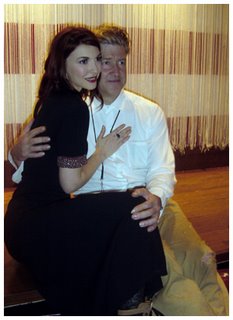
According to David Lynch's friend and collaborator, John Neff, over at
Twin Peaks Gazette, the long-anticipated (well, here at
casa del ionesco at any rate) Chrysta Bell/David Lynch/John Neff musical, and associated video, projects are now unlikely to see the light of day:
Well, Dave and I did three songs that Chrysta came in and sang on (Does that make them 'hers'?). We shot videos of them at a club where we did a scene from "Inland Empire". Some of it was supposed to be in the movie, I guess, I never got a definitive answer. We were supposed to finish a CD project with her last year, but it never happened. The videos were supposed to go to some media outlet, I never heard which if any had been contacted. The songs were supposed to be released to iTunes this year, as well as some Rebekah Del Rio stuff that we did. When the contract arrived it was horrendous and was rejected. I have only heard from his attorney that the releases have been cancelled and I believe they will not be in the film either. I have also heard that she is recording new stuff with David that I am not a part of. This is all I know.
The club where Lynch shot the Chrysta Bell videos, and one of the scenes for his upcoming movie,
Inland Empire, was L.A. burlesque joint
Forty Deuce.
One of the songs which Lynch, Neff and Bell collaborated on, has finally shown up in the following scene, taken from a DVD called
Room To Dream, which showcases Digital Video (Lynch's chosen delivery medium for
Inland Empire) as an affordable and user-friendly option for aspiring auteurs. Sadly, the divine Bell is absent, though, like the bizarre male character in this scene (and The Mystery Man in
Lost Highway), she's simultaneously absent
and present: her ethereal vocals are replaced by the rather more earth-bound vocal stylings of the almost equally beautiful Chrysta Bell doppelganger, Kristin Kerr, Stanley Kamel & the other, relatively unremarkable, actress who appears in the scene.
Kamel and Kerr both feature in
Inland Empire's
cast, and it is thought that this scene is an excerpt ~ or a reworking, or a rough draft, of a scene ~ from that movie. Of course, it may be an entirely unconnected scene, shot exclusively for the "R2D" DVD during a break in the
Inland Empire shoot, but John Neff's enigmatic posts on the
Twin Peaks Gazette forum seem to substantiate the former theory.
Ersatz Empire ?
Kristen Kerr, in a Lynch-esque identity twist, is also due to star in an alternate version of James Ellroy's
Black Dahlia story, due to be released almost simulataneously with the
Brian De Palma version. In the doppelganger "Dahlia", Kerr plays two different characters (Lisa Small and Elizabeth Short) and is one of two actresses to portay Short (the other, Lizzy Strain, also "plays" herself). Sounds almost convoluted enough to be the plotline to Lynch's
Mulholland Dr.



